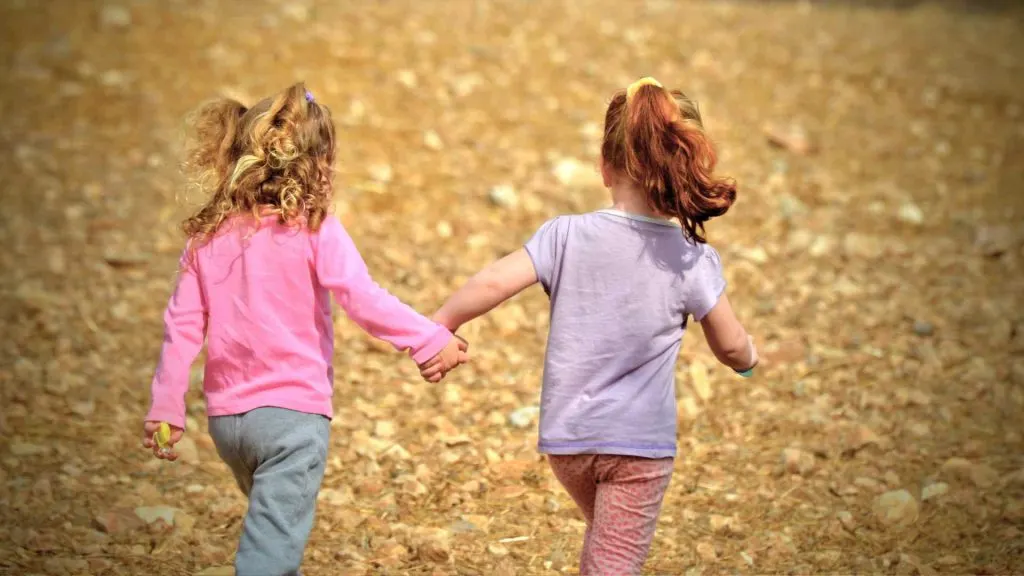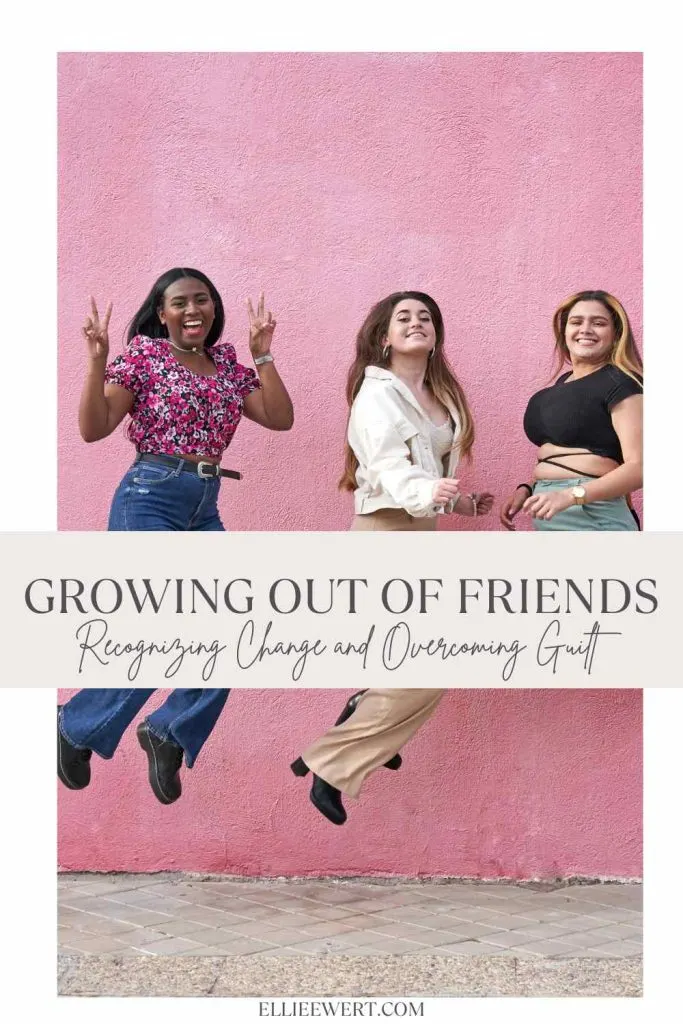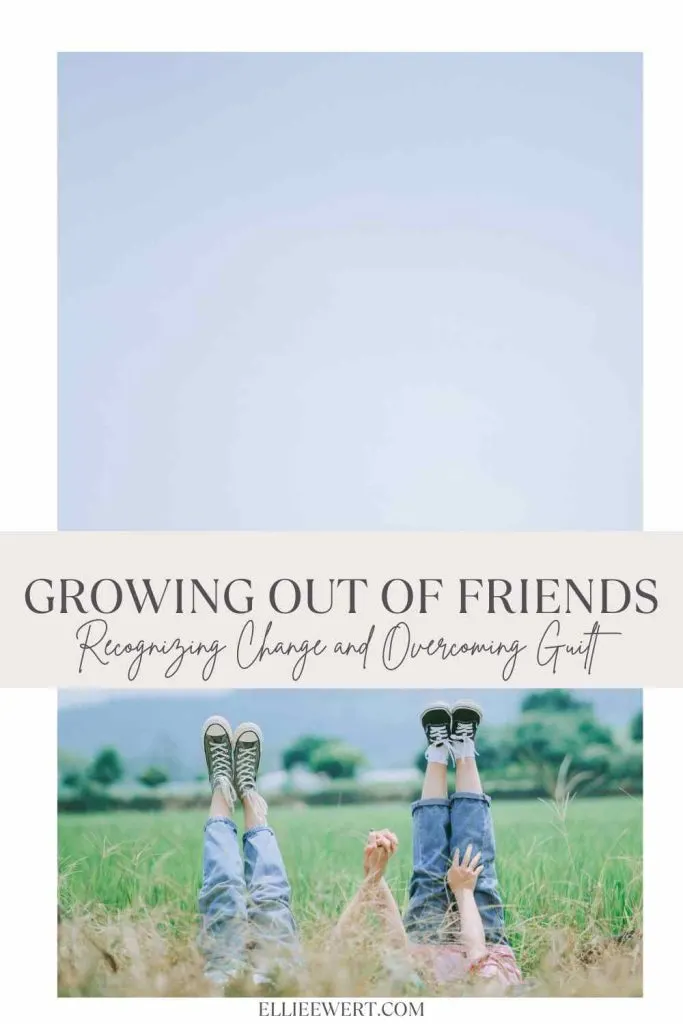As we journey through life, our relationships evolve.
The process of growing out of friends is a natural part of this evolution. It’s common to find that as we change and develop, so do our friendships.

Recognizing Change
Shifting Interests
When it comes to recognizing change, individuals should embrace new hobbies and activities that resonate with personal growth.
Exploring different interests is crucial in expanding social circles and potential friendships. By prioritizing spending time with individuals who share similar passions and values, one can foster meaningful connections that align with their evolving self.
In the process of recognizing change, it’s important to acknowledge when core values no longer align with friends and be open to evolving relationships.
Surrounding oneself with individuals who uplift and support their beliefs is essential for personal development. Understanding that outgrowing friendships based on values is a natural part of growth allows for smoother transitions in social dynamics.
Diverging values can lead to shifts in friendships, but it’s also an opportunity for individuals to reflect on how these relationships contribute to or hinder progress towards life goals.
Seeking friends who align with aspirations and provide positive encouragement can greatly impact personal growth. Embracing changes in friendships as a reflection of evolving life priorities enables individuals to nurture connections that complement their journey.
Life Goals Evolution
In navigating the process of growing out of friends, reflecting on how friendships contribute to or hinder progress towards life goals is pivotal.
It allows individuals to evaluate the impact of their social circle on personal development. Seeking friends who align with aspirations is a proactive step towards fostering a supportive environment conducive to achieving one’s goals.
As life goals evolve, so do the dynamics of friendships. Embracing these changes as a reflection of evolving life priorities empowers individuals to curate a network that supports their journey. It’s essential to recognize the influence of friendships on personal growth and adjust social circles accordingly.

Trusting Instincts
Inner Voice Listening
Trusting instincts is crucial when it comes to navigating the complexities of friendships. Sometimes, we may feel a sense of disconnection or unfulfillment in our relationships with friends.
It’s essential to pay attention to those internal cues that signal the need for change. Decisions based on these instincts can lead to healthier and more fulfilling connections with others. Listening to our inner voice can guide us towards kindred spirits who align with our values and aspirations.
Trusting our instincts also means practicing self-compassion when making choices about friendships. It’s important to recognize that the decisions we make are rooted in a deep sense of something being amiss at the bottom of our hearts.
This innate sense often leads us to someone or something that resonates more authentically with who we are.
Self-Protection Importance
Acknowledging the importance of prioritizing mental and emotional well-being in friendships is paramount. Setting boundaries becomes essential in protecting oneself from toxic or draining relationships.
Outgrowing friendships is not just about moving on; it’s a form of self-protection and growth. By recognizing when certain relationships no longer serve us, we create space for new, healthier connections to flourish.
Understanding that outgrowing friendships is a form of self-protection allows us to embrace this natural process without guilt or hesitation. It’s a way of honoring ourselves and recognizing that personal growth sometimes requires letting go of familiar but no longer beneficial relationships.
Breaking Patterns
Breaking old habits and patterns is an integral part of personal growth. Many times, we find ourselves engaging in people-pleasing behaviors that hinder authentic connections with others.
Challenging these behaviors is essential for fostering genuine and meaningful relationships. Embracing discomfort as a sign of breaking old relational patterns allows us to pave the way for more authentic interactions.
Allowing space for personal growth involves letting go of behaviors that no longer serve us positively in our friendships. It’s about recognizing that change often brings discomfort but also opens doors to new opportunities for connection and fulfillment.
Signs of Drifting
When it comes to avoiding interaction, recognizing the need for personal space and boundaries is essential. It’s important to acknowledge that taking a step back from constant communication can be a healthy choice. Sometimes, individuals may need time to reflect, recharge, and focus on personal growth.
Ignoring calls can serve as a form of self-care, allowing individuals to prioritize their mental and emotional well-being.
By understanding the significance of setting boundaries in communication, one can navigate friendships with greater clarity and intention. Recognizing when it’s necessary to step back from constant availability is crucial for maintaining a healthy balance in relationships.
Prioritizing responses to calls that contribute positively to emotional well-being is an empowering practice. Understanding that not all interactions are beneficial allows individuals to make conscious choices about where they invest their energy.
By acknowledging the impact of communication on personal growth, one can make informed decisions about engaging in conversations that align with their values and aspirations.

Emotional Impact
Invisibility Feelings
Growing out of friends can often lead to feelings of invisibility. As friendships evolve, some individuals may feel like they are gradually becoming invisible to their once-close friends.
This feeling usually stems from a lack of acknowledgment or attention in social settings. For example, when everyone is engaged in a conversation but no one includes you or seeks your opinion, it can intensify the sense of invisibility.
The emotional impact of feeling invisible can be profound. It may lead to a decline in self-esteem and confidence. Individuals might start questioning their worth and significance in the eyes of others.
This emotional toll can also extend beyond social interactions and affect one’s overall mental well-being. The effort put into maintaining friendships might seem futile when this feeling persists, further exacerbating the emotional strain.
Hurt Experiences
Experiencing hurt as a result of growing out of friends is not uncommon.
Hurt experiences may arise from various situations, such as being excluded from group activities or learning about gatherings after the fact. These instances can trigger feelings of rejection and disappointment, causing emotional distress for those involved.
The hurt experienced in these scenarios can linger and impact future interactions with other friends. It may lead to heightened sensitivity towards potential signs of exclusion or rejection, making it challenging to form new connections without carrying the emotional baggage from past experiences.
Moreover, the hurt experienced during this phase may also affect trust in friendships, leading individuals to approach new relationships with caution and apprehension.
Suffocation Feelings
Amidst the process of growing out of friends, individuals might grapple with suffocation feelings within their existing social circles. This sensation arises when one feels overwhelmed by the dynamics within the friendship group.
For instance, constant disagreements or conflicts among friends can create an emotionally suffocating environment, making it difficult for individuals to express themselves freely.
Suffocation feelings may also stem from a mismatch between personal growth and the dynamics within the friendship group.
As individuals evolve and pursue different interests or goals, they might feel constrained by the expectations or norms established within their circle of friends.
This sense of suffocation can hinder personal development and contribute to heightened stress levels as individuals navigate these conflicting emotions.
Coping Mechanisms
Communication Tips
Effective communication is essential when navigating the complexities of growing out of friendships.
Expressing your feelings openly and honestly can help in maintaining clarity and understanding between you and your friends. By communicating openly, you can address any concerns or issues that may arise during this transition period.
It’s crucial to actively listen to your friends’ perspectives and emotions.
This not only fosters a sense of empathy but also creates an environment where both parties feel heard and understood. Listening attentively can lead to more meaningful conversations, allowing for a smoother transition as you grow apart from certain friends.
Moreover, it’s important to choose the right timing for difficult conversations.
Finding a suitable moment when both you and your friend are relaxed and receptive can significantly impact the effectiveness of your communication. By being mindful of timing, you can ensure that your discussions are constructive and respectful.
Setting Boundaries
Setting boundaries is an integral part of coping with the changes in friendships. It’s essential to establish clear limits on what you’re comfortable with and communicate them effectively.
By setting boundaries, you create a framework for healthy interactions with your friends, minimizing potential misunderstandings or conflicts.
Furthermore, it’s crucial to prioritize self-care by recognizing when certain relationships may be causing emotional distress or discomfort. Establishing boundaries allows you to protect your well-being while fostering relationships that align with your values and emotional needs.
Don’t hesitate to reassess boundaries as needed. As circumstances change, it’s important to revisit and adjust your boundaries accordingly. This flexibility enables you to maintain healthy connections while ensuring that your emotional well-being remains a top priority.
Self-Reflection Exercises
Engaging in self-reflection exercises can aid in processing the emotions associated with growing out of friendships. Take time for introspection, allowing yourself to explore the reasons behind these changes and gain insights into how they impact your emotions.
Moreover, consider journaling as a form of self-reflection. Writing down your thoughts and feelings provides an outlet for self-expression while enabling you to track patterns in your emotions as you navigate this transition period.
Furthermore, practicing mindfulness techniques such as meditation or deep breathing exercises can help in managing stress and promoting emotional balance during this phase of adjustment.

Overcoming Guilt
Guilt in Changes
Guilt can often accompany changes in friendships, especially when one is growing apart from old friends.
It’s natural to feel guilty about evolving friendships, but it’s important to recognize that change is a part of life. Therapists often encourage individuals to acknowledge their feelings of guilt and explore the reasons behind them.
When friendships evolve and change, it’s common for individuals to experience guilt about leaving old friends behind.
Therapists suggest that acknowledging this guilt is the first step towards overcoming it. By recognizing these feelings, individuals can start to understand why they feel guilty and work through those emotions.
etimes, people feel guilty because they believe they are betraying their old friends by moving on and making new connections.
Therapists often help individuals reframe these thoughts by emphasizing the importance of personal growth and the natural evolution of relationships. Understanding that change is inevitable and necessary for personal development can alleviate the burden of guilt.
Embracing Evolution
As friendships naturally evolve, it’s crucial to embrace these changes rather than dwell on feelings of guilt. Therapists often guide individuals in understanding that evolving friendships are a sign of personal growth and self-discovery.
Embracing this evolution allows individuals to appreciate the value of both past and present friendships without being weighed down by guilt.
One way to embrace the evolution of friendships is by focusing on gratitude for the memories shared with old friends while also welcoming new connections into one’s life.
Therapists encourage individuals to express gratitude for the positive impact their old friends have had on their lives while remaining open to forming new meaningful relationships. This approach helps shift the focus from guilt to appreciation and excitement for what lies ahead.
Moreover, embracing evolution involves letting go of the notion that change equates to disloyalty or abandonment.
Therapists often work with individuals to reframe their perspectives on friendship dynamics, emphasizing that change does not diminish the value of past relationships but rather signifies personal growth and adaptation.
By accepting this perspective, individuals can navigate evolving friendships with a sense of understanding and acceptance.
Personal Growth
Self-Discovery Focus
Embarking on a journey of personal growth often involves discovering new aspects of oneself. It’s about understanding one’s strengths, weaknesses, and passions.
This process allows people to gain clarity about their identity and purpose in life. For instance, exploring various hobbies or activities can lead to the discovery of hidden talents or interests that were previously unknown.
Moreover, self-discovery is not a one-time event; it is an ongoing course of exploration and introspection.
People may find that their interests and priorities evolve over time, leading to new revelations about themselves.
This continuous process of self-discovery is essential for personal growth as it enables individuals to adapt to changing circumstances and align their actions with their true selves.
Self-discovery often involves stepping out of one’s comfort zone. Trying new things and taking risks can be instrumental in uncovering previously unrecognized potential. By challenging themselves, individuals can push past perceived limitations and unearth hidden capabilities they never knew they possessed.
New Connections Building
In the pursuit of personal growth, building new connections with diverse individuals can be immensely beneficial.
Meeting new people from different walks of life exposes individuals to fresh perspectives and ideas. Engaging with a diverse range of people helps broaden one’s worldview and fosters a greater understanding of the world around them.
Furthermore, forging new connections provides opportunities for collaboration and learning. Interacting with people who have varied backgrounds or expertise can lead to valuable insights and knowledge exchange.
These interactions enable individuals to expand their horizons and acquire new skills that contribute to their personal development.
Moreover, forming meaningful relationships with others creates a support system that is crucial for navigating the challenges associated with personal growth.
Having a network of supportive friends and mentors offers encouragement, guidance, and feedback as individuals navigate their paths toward self-improvement.

Future Friendships
Growing Together Apart
As we all grow older, old friendships may naturally evolve and change. Some friends may relocate to different cities, start families, or pursue new career paths.
Despite these changes, it’s essential to recognize that growing apart from old friends doesn’t diminish the value of the bond shared in the past. It’s natural for people to develop different interests and priorities as they age, leading to a divergence in lifestyles and experiences.
Maintaining a connection with old friends is crucial even when physical distance separates you. Thanks to modern technology, staying in touch has become more accessible than ever.
Regular video calls, text messages, and social media interactions can help bridge the gap between friends living in different places. These virtual connections allow individuals to share their lives, offer support during challenging times, and celebrate each other’s achievements despite being miles apart.
While it may be bittersweet to witness the evolution of our friendships, it’s important to embrace the positive aspects of these changes.
Old friendships that withstand the test of time often hold a deep sense of history and shared memories. These bonds can serve as a source of comfort and nostalgia, reminding us of who we were and how far we’ve come since those early days of friendship.
Impact on Career
The influence of old friendships on one’s career trajectory should not be underestimated. Networking plays a pivotal role in professional growth, and many individuals find that their long-standing friendships open doors to new opportunities.
Whether through referrals for job openings or collaboration on business ventures, maintaining connections with old friends can lead to unexpected career advancements.
Moreover, the emotional support provided by close friends can significantly impact an individual’s confidence and motivation at work. Sharing challenges and successes with trusted friends can provide valuable perspective and encouragement during demanding periods in one’s career journey.
On the flip side, as individuals progress in their careers, they may find themselves with less time for socializing due to work commitments or family responsibilities.
This shift can sometimes strain old friendships, especially if both parties are navigating different life stages. However, recognizing this dynamic allows individuals to make intentional efforts to sustain these meaningful connections despite busy schedules.
Mental Health Influence
The evolution of old friendships can have a profound impact on mental well-being. While forming new connections is enriching, losing touch with long-time friends can evoke feelings of nostalgia and longing for the past.
However, embracing this change as a natural part of life can lead to personal growth while cherishing the memories created with those friends.
Moreover, strong social support systems are vital for mental health. Nurturing existing friendships provides a sense of belonging and emotional stability during life’s ups and downs.
Even when geographical barriers exist, maintaining communication with old friends contributes positively to one’s overall well-being.
On the other hand, navigating changing dynamics within old friendships might also bring about moments of introspection and self-discovery.
Recognizing that relationships evolve over time encourages individuals to adapt to change while appreciating the enduring value that these connections hold throughout various stages of life.
Final Remarks
Recognizing changes in friendships is crucial for your well-being. Trust your instincts and acknowledge the signs of drifting apart.
The emotional impact might be significant, but implementing coping mechanisms can help you overcome guilt and foster personal growth. Embrace the lessons learned to form healthier future friendships.
As you navigate the complexities of evolving friendships, remember that change is a natural part of life. Stay attuned to the dynamics of your relationships and prioritize those that align with your values.
Your ability to adapt and grow from these experiences will pave the way for more fulfilling connections in the future.
Frequently Asked Questions
How do I recognize if I am growing out of friends?
If you find yourself feeling disconnected or uninterested in activities you used to enjoy with certain friends, it may indicate that you are growing out of the friendship. Trust your instincts and acknowledge changes in your interests and values.
What are some coping mechanisms for growing out of friends?
Engage in self-care activities, seek support from other social circles, and consider open communication with your friends about the changes. Reflect on the positive aspects of the friendship and focus on personal growth opportunities.
What are the signs of drifting in a friendship?
Decreased communication, lack of shared interests, and feeling emotionally distant are common signs of drifting in a friendship. Pay attention to changes in the dynamics and evaluate how these affect your well-being.
How can I overcome guilt associated with growing out of friends?
Recognize that personal growth often involves change, including shifts in friendships. Understand that it’s natural to evolve and prioritize connections that align with your current values and aspirations. Communicate honestly but compassionately with your friends about these feelings.


